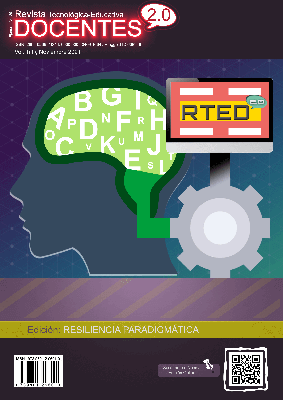Inclusive Sports as an Alternative Life for Young People with Disabilities
 DOI:
https://doi.org/10.37843/rted.v1i1.214
DOI:
https://doi.org/10.37843/rted.v1i1.214
Main Article Content
Abstract
Every day we find that each person has barriers, but not limits. Disability becomes evident when obstacles are put in place. These, in turn, restrict the participation of people in all contexts; when it occurs in young people, it goes to the background because they are more robust; they make it an ally. In this research, we reflected on the physical limitations that some young people have had. A search was carried out for documents and worked around the term of inclusion, which generated qualitative research that aimed to analyze how inclusive sport strengthens the life stories of young people with disabilities in the department of Córdoba. The population was represented by 14 young people with intellectual, hearing, and physical disabilities, a sample of 7 young people who practice adapted sports was chosen. Then, carried out direct observation and a semi-structured interview to elaborate on the stories of life stories. The study evidenced the inclusive processes currently taking place in adapted sport, highlighting the different life stories of young people with disabilities. Finally, the analysis understood that the practice of adapted sports contributes to improving the quality of life by giving meaning to what they do, becoming increasingly more robust as a person.
Downloads
Metrics
Article Details

This work is licensed under a Creative Commons Attribution-NonCommercial-NoDerivatives 4.0 International License.
Those authors who have publications in our journal accept the following terms:
- When a work is accepted for publication, the author retains rights of reproduction, distribution of his/her article for exploitation in all countries of the world in the format provided by our magazine and any other magnetic medium, optical, and digital.
- Authors will retain their copyright and guarantee the journal the right first to publish their work, which will be simultaneously subject to the Creative Commons Acknowledgment License (Attribution-NonCommercial-NoDerivatives 4.0 International (CC BY-NC-ND 4.0)). That allows third parties to copy and redistribute the material in any medium or format, under the following conditions: Acknowledgment - You must properly acknowledge authorship, provide a link to the license, and indicate if any changes have been made. You may do so in any reasonable way, but not in a way that suggests you have the licensor's endorsement or receive it for your use. NonCommercial - You may not use the material for a commercial purpose. NoDerivatives - If you remix, transform, or build from the material, you cannot broadcast the modified material. There are no additional restrictions - You cannot apply legal terms or technological measures that legally restrict you from doing what the license allows.
- Authors may adopt other non-exclusive license agreements to distribute the published version of the work (e.g., deposit it in an institutional archive or publish it in a monographic volume) provided that the initial publication in this journal is indicated.
- Authors are allowed and recommended to disseminate their work through the Internet (e.g., in institutional telematic archives, repositories, libraries, or their website), producing exciting exchanges and increasing the published work's citations.
- Request of withdrawal an article has to be done in writing by the author to the Editor, becoming effective after a written response from the Editor. For this purpose, the author or authors will send correspondence via e-mail: [email protected].
- The author will not receive financial compensation for the publication of his work.
- All Docentes 2.0 Journal publications are under the Open Journal System (OJS) platform at: https://ojs.docentes20.com/.
References
Alheit, P. & Dausien, B. (2008). Procesos de formación y aprendizaje a lo largo de la vida. Revista de la Asociación de Sociología de la Educación, 1(1). 25-28.
Arraez, M. J. (2013). El deporte adaptado: historia, práctica y beneficios. Málaga: IAD.
Bandura, A. (1986). Social foundations of thought and action: A social cognitive theory. Englewood Cliffs, NJ: Prentice-Hall.
Bandura, A. (1999) Autoeficacia: como afrontamos los cambios de la sociedad. Chile, pág. 223-225
Blasco-Mira, M. & Pérez-Turpin, J. (2007). Metodología de la investigación en Ciencias de la Actividad Física y el Deporte. Editorial Club Universitario
Cajamarca, C. (1994) Aprender a educarse, a ser y a obrar. Editora Géminis Ltda,
Díaz-Better, H. R. & Eusse-López, C. (2021). Uso del deporte Boccia como herramienta de inclusión en la clase de educación física: un estudio de mapeo sistemático. VIREF Revista De Educación Física, 10(1), 96-107.
Gómez-Bohórquez, W. (2019). Historias de Vida de Profesionales con Discapacidad en el Contexto de Educación Física, Deporte y Recreación. Universidad Pedagógica Nacional.
Gómez-Rodríguez, M. (2017). Inclusión Laboral de Docentes con Discapacidad Visual en el Campo Educativo. Universidad Pedagógica Nacional.
Hernández-Sampieri, R., Fernández-Collado, C. & Baptista-Lucio, N. (2014). Metodología de la Investigación. 6ta edición. McGraw-Hill / Interamericana Editores, S.A.
Kearney, M., Orrell, R., Fahey, M., Brassington, R. & Pandolfo, M. (2016). Pharmacological treatments for Friedreich ataxia. Cochrane Database of Systematic Reviews, 8. Art. No.: CD007791. DOI: 10.1002/14651858.CD007791.pub4 DOI: https://doi.org/10.1002/14651858.CD007791.pub4
Montes-Delgado, R., Palos-Toscano, U. & Avalos-Latorre, M. (2016). Influencia de la Práctica del Deporte Adaptado sobre la Calidad de Vida: Un Estudio Cualitativo. EmásF, Revista Digital de Educación Física. (8)43. http://emasf.webcindario.com
Organización Mundial de la Salud (OMS) (2001). Clasificación Internacional del Funcionamiento, de la Discapacidad y de la Salud. Ministerio de Trabajo y Asuntos Sociales. Secretaría de Estado de Servicios Sociales, Familias y Discapacidad. Instituto de Mayores y Servicios Sociales (IMSERSO).
Pérez, T., Blasco, Y., González, L., García, H., Soto, R. & Coterón, J. (2013). Paraciclismo: estudio sobre los procesos de integración a nivel internacional. Apuntes: Educación Física y Deportes, 111, 79-86. DOI: https://doi.org/10.5672/apunts.2014-0983.es.(2013/1).111.08
Salazar-Arbués, J. & Escós-Julián, A. (2020). El Deporte inclusivo en las aulas. Universidad de Zaragoza.
Taylor, S., Bogdan, R. & DeVaiult, M. (2016). Introduction to qualitative research methods: A guide and resource (3ª ed.).






